UCL: Vinícius has wounded Liverpool before he can do it again
Vinícius has exploded into arguably the best-left winger in the world, forming the most formidable attacking partnership in Europe with Benzema
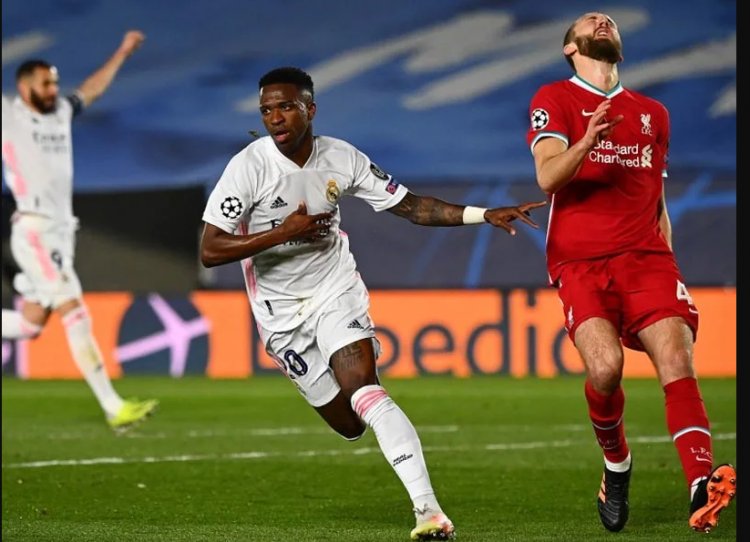
For all the attention on the Ballon d’Or favourite Karim Benzema, the breakout star of Real Madrid’s season is Vinícius Júnior.
The Brazil winger was only 16 when Real agreed a deal to sign him from Flamengo in 2017, but this season has been his coming of age.
Now, at 21, Vinícius has exploded into arguably the best-left winger in the world, forming the most formidable attacking partnership in Europe with Benzema.
Across La Liga and the Champions League, the pair have a combined 91 goal involvements (55 goals and assists for Benzema and 36 for Vinícius) — not even Liverpool’s Mohamed Salah and Sadio Mané (68 goal involvements) can match it.
Vinícius arrived from Flamengo as a raw, bright and pacey winger but struggled to impress in the Spanish capital until recently.
In October 2020, during half-time in a Champions League match against Borussia Monchengladbach, Benzema was caught on camera speaking to his French team-mate, Ferland Mendy, where he instructed him not to pass to Vinícius, saying: “Il joue contre nous” (“He plays against us”).
Now though, Vinícius is highly valued by his captain and has made the wing position his own.
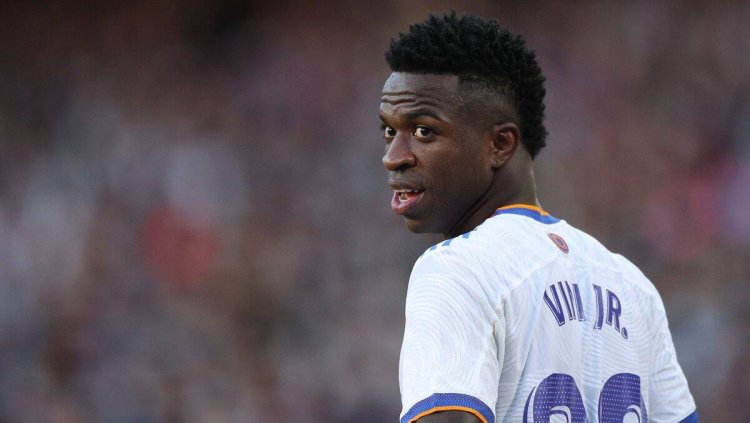
Vinícius has refined his skillset considerably this season, developing his attacking instincts under Carlo Ancelotti — although the Real manager insisted in October that he was not responsible for his player’s progression, saying: “I didn’t do anything, I’m not a wizard. I’m playing him and I’m giving him my confidence.”
Now Vinícius performs with the maturity of an experienced winger, thoughtfully choosing his moments to run, shoot or pass, but he is still unmistakably playing with the joie de vivre of a youthful star revelling in the unimaginable opportunity of playing for Real Madrid.
Vinícius’ pace and youthful exuberance make him the perfect tactical outlet for Real. The ageing midfielders who sit behind him do not press like their contemporaries in England or Germany. Instead, when without possession they sit deep, which invites opponents to move upfield and leave space in behind — something which the winger gratefully accepts.
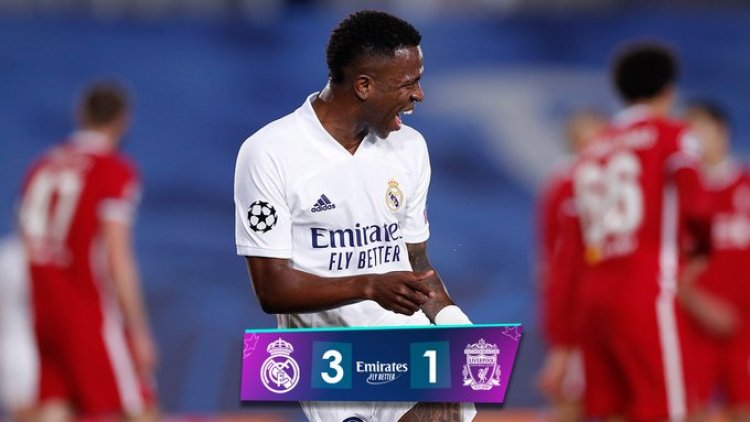
Last year, the Brazilian tormented Liverpool’s defence, scoring twice in Real’s 3-1 Champions League quarter-final first-leg victory. His first goal came as he ran between Trent Alexander-Arnold and Nathaniel Phillips, to meet a precise pass from Toni Kroos, controlling the ball with his chest as he broke beyond Phillips, then finishing with an unerring right-footed strike across Alisson.
It was the presence of Vinícius which prompted Alexander-Arnold to nod a ball inside, to Marco Asensio, for Real’s second, while for their third goal he stole across from the right to the penalty spot, where he met Luka Modric’s pass ahead of Phillips.
This season, in Real’s Champions League quarter-final first-leg against Chelsea at Stamford Bridge, Vinícius tormented Andreas Christensen, breaking in behind Reece James, isolating the Dane and running him ragged with his pace, dribbling and irrepressible energy.
Within the first ten minutes of the match, Vinícius had cut inside and struck the crossbar — a warning shot of what was to come.
In the 21st minute, Benzema dropped deep to receive a pass from the winger, and fired in an instantaneous defence-splitting pass for Vinícius to run on to. In a flash, Vinícius tore up the space in front of him, leaving Christensen in his wake, before clipping a tight first-time cross into Benzema, who headed beyond Édouard Mendy.
With only three touches and exquisite movement, the pair had shattered Chelsea’s defence with rapid, instinctive and decisive play.
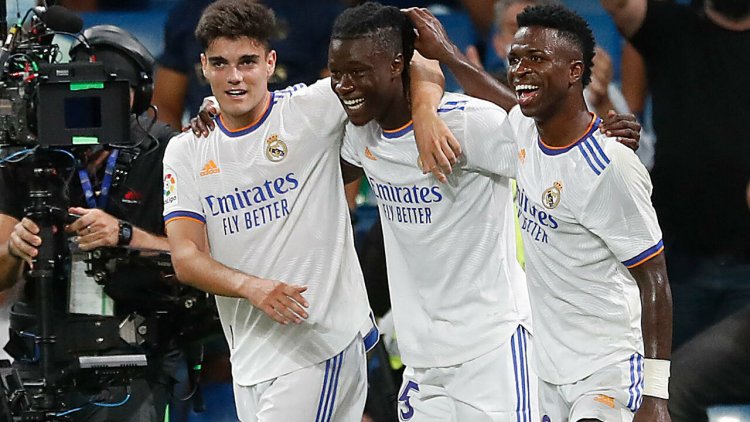
Compared to last season, Vinícius has developed his all-round game, and is a much more complete player.
He scores and creates more goals than he did last season, demonstrated by the higher volume of shots he takes per game and the greater expected assists value he produces.
Expected goals assisted (or xA) is a measure of the quality of a chance created — often assists can be a misleading or statistically “noisy” stat as they are dependent on the shot-taker converting the chance.
Expected goals assisted quantify the likelihood of the chance created being scored, and credit that to the assist-maker.
In other areas, such as successful dribbles or pass success rate, Vinícius has either maintained his level or marginally improved upon it.
Not only is Vinícius a goalscorer with a creative touch, but he is also a frighteningly skillful dribbler, able to take opponents on and burn past them with his close control, trickery and scorching pace. Only Newcastle’s Allan Saint-Maximin has attempted more dribbles than the Brazilian in Europe’s top five leagues this season.
While a success rate of 44.9 per cent may not seem impressive, it is better than Salah and only marginally worse than Paris Saint Germain’s Neymar (47.9 per cent).
Earlier in his Champions League campaign, Vinícius flummoxed Shakhtar Donetsk’s defence with his close control, body feints and sumptuous finishing.
Vinícius’s willingness to dribble is an enormously valuable tactical element; he often stretches opposing teams, forcing them to drop deeper, which creates more spaces for Real’s midfielders to play in or through.
Nowhere was this more obvious than in the Champions League semi-final first-leg against Manchester City, when the Brazilian raced past stand-in full back Fernandinho to pull the deficit back to just one goal. With his team barely hanging in the game and unable to wrest possession away from Pep Guardiola’s side, Vinícius’s fleet-footedness salvaged a situation that looked doomed.
When he dribbles, Vinícius tends to receive the ball in wide positions but he is particularly proficient at moving inside, beating his opposite full back and getting shots away.
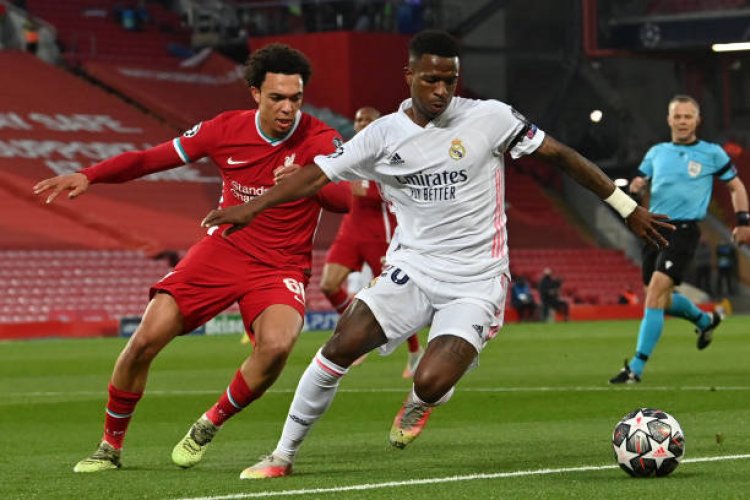
Vinícius has scored all but one of his goals this season from inside the box thanks to his intelligent movement. While the majority of his shots naturally come from the left side of the box, he regularly gets shots away from the middle of the penalty area, which he does by timing his runs beyond defenders or dropping in for cut-back passes.
This movement and intelligence to choose when and where to shoot from is quantified in his expected goals statistics.
Expected goals is a measure of shot quality, calculated by factors such as where the shot is taken from and proximity of opponents.
This season in La Liga, Vinícius has an xG per shot of 0.16. This means he typically takes shots which have a 16 per cent chance of being scored — higher than any of his team-mates, including Benzema (0.13 xG per shot). Furthermore, he tends to finish these chances better than most players too, converting at a 22 per cent rate.
With such strong numbers, Vinícius already sits alongside some of the finest wingers of his generation.
On Saturday, Liverpool will be wary that the Vinícius they faced last season was more than a handful. Now he has developed into a more complete and formidable winger, able to finish and create chances for himself and his team-mates. If he is afforded the space he was last season, he will almost certainly punish Liverpool.
Despite the public heartache of missing out on the French superstar, Kylian Mbappé, Real already have a star ready to turn supernova on the biggest stage of all. (From Times of London)




















